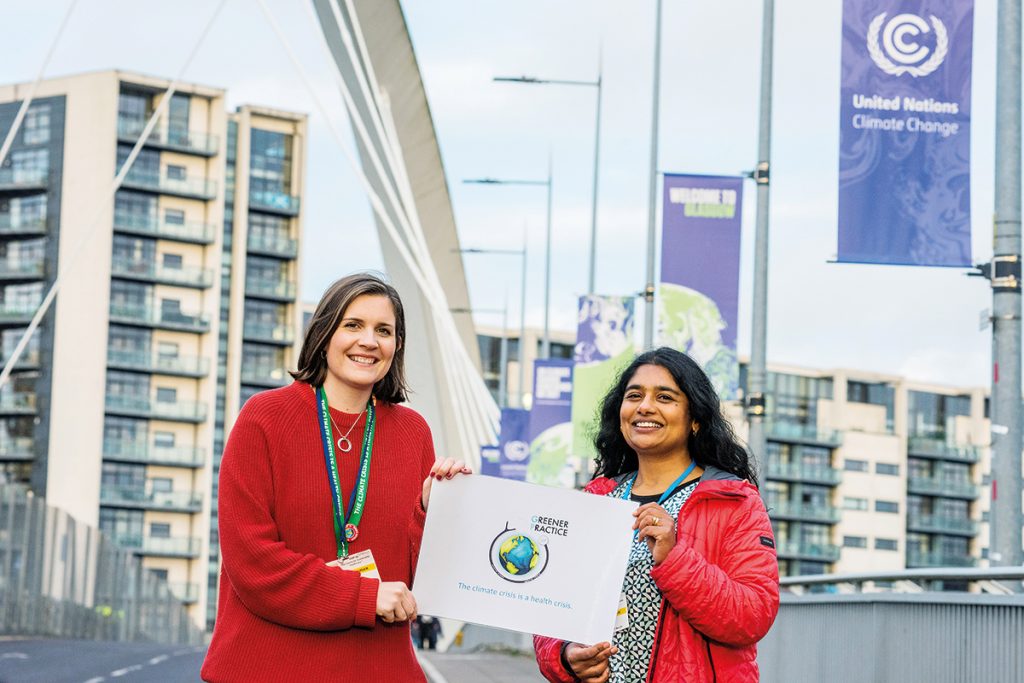Climate change crusaders

Dr Tamsin Ellis and Dr Aarti Bansal, GP members of the Greener Practice network, share their highlights from this winter’s COP26 global conference held in Glasgow
Thursday
Hope and despair
The conference is vast – much bigger than it looks on TV. A huge floating earth is hung above a circular room that’s bustling with journalists and attendees. Parked nearby is the world’s first zero-emissions ambulance, alongside more dubious sponsors that make us worry about industry influence and greenwashing.
In a plenary room session, the report from the Intergovernmental Panel on Climate Change is brought to life, telling the science of our warming planet. It’s scary, filled with predictions of what will happen as warming climbs above 1.5˚C. In the Q&A, we hear from small island states asking richer countries to listen to their pleas as they see predictions of their demise. It’s upsetting.
Next is a ‘healthcare without harm’ panel. It’s an emotional afternoon, hearing campaigner Rosamund Adoo Kissi Debrah talk about the death of her daughter Ella from air pollution and her tireless efforts to change medical education and government policy. Air pollution reminds us of our role as GPs helping to advocate for clean air in our communities, by contributing to local planning for active travel and green spaces and improving education for patients to prevent hotspots of air pollution. After an exhausting but interesting day, we head out for food.
Friday
Empowerment and solidarity
Today is the youth empowerment day, and we spend most of the morning in the World Health Organization (WHO) pavilion.
We watch as Centre for Sustainable Healthcare (CSH) representatives talk about how prevention, patient empowerment, lean systems and low-carbon alternatives can be integrated into healthcare education. They share their learning of how implementing sustainable quality improvement (SusQI) activity motivates students and clinicians.
Prescribing is a key topic in primary care. Through quality improvement (QI), we think about how sustainable healthcare could reduce prescriptions, improve self-management and prevent waste. The talks also point towards improving access to nature-based or social prescribing, reducing problematic polypharmacy, and increasing the number of patients taking their preventer treatment in asthma.
We rush to join an open session with former US vice-president and environmentalist Al Gore. Gore gives a terrifying presentation of the impacts of climate change right now across the globe – houses crumbling away from coastlines; starving families; people in offices being rescued as flood water pours in. We’re shocked to learn that a baby born in Warsaw is exposed to the equivalent of 1,000 cigarettes from smog and air pollution in their first year of life.
As GPs, we’re struck by the power of stories that connect the climate crisis to health. Back in the WHO pavilion, we hear from Dr Courtney Howard, an emergency medicine doctor in Canada who stood for office last summer. She asks for health workers to get political.
Just as we’re leaving, Aarti spots politician Ed Miliband. We chat about the tremendous opportunity to improve population health through climate action. By supporting active travel, access to green spaces, addressing fuel poverty and improving access to healthy plant-based food, we can improve health now, save the NHS millions and motivate the public to demand climate action. We feel energised as we set out to meet Greener Practice Scotland groups.
Saturday
Power to the people
It’s pouring with rain as we join over 100,000 people marching for climate justice. On Hope Street, the most polluted street in Glasgow, we take part in a ‘die-in’ – lying on the ground to represent the millions of people all over the world dying from air pollution every year.
Looking at the expanse of people, we feel hopeful – not because of the conference itself, but because of the passion of the public collectively raising the alarm. The message from COP26 is clear – we’re running out of time. We need to act now, and put health at the heart of our response.
Profiles
Dr Tamsin Ellis
Location London
Roles Salaried GP; clinical lead for sustainability in primary care at North Central London ICS; chair of Greener Practice London; associate of
the CSH; representative at Islington LMC
Hours worked Five clinical sessions; two clinical lead sessions; and others ad hoc
Dr Aarti Bansal
Location Sheffield
Roles Salaried GP; net zero GP lead at Humber Coast and Vale ICS; founder of Greener Practice; Council member of the RCGP; associate of the CSH; honorary senior lecturer at Hull York Medical School
Hours worked Two clinical sessions; two clinical leadership sessions; and ad hoc elsewhere
Pulse July survey
Take our July 2025 survey to potentially win £1.000 worth of tokens











